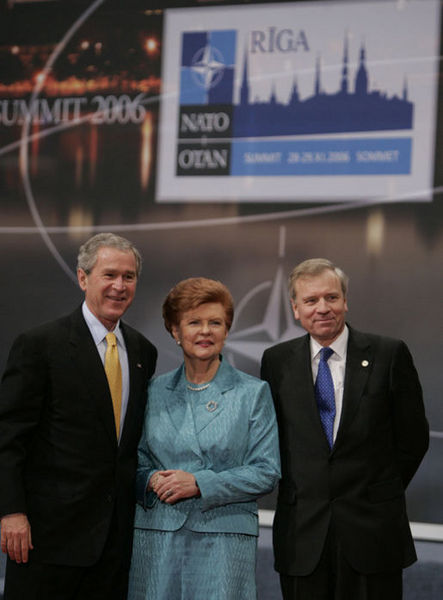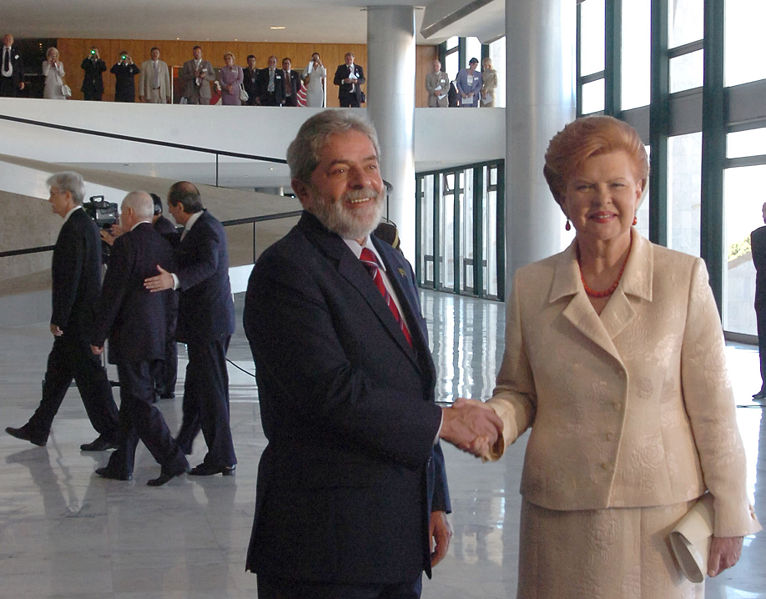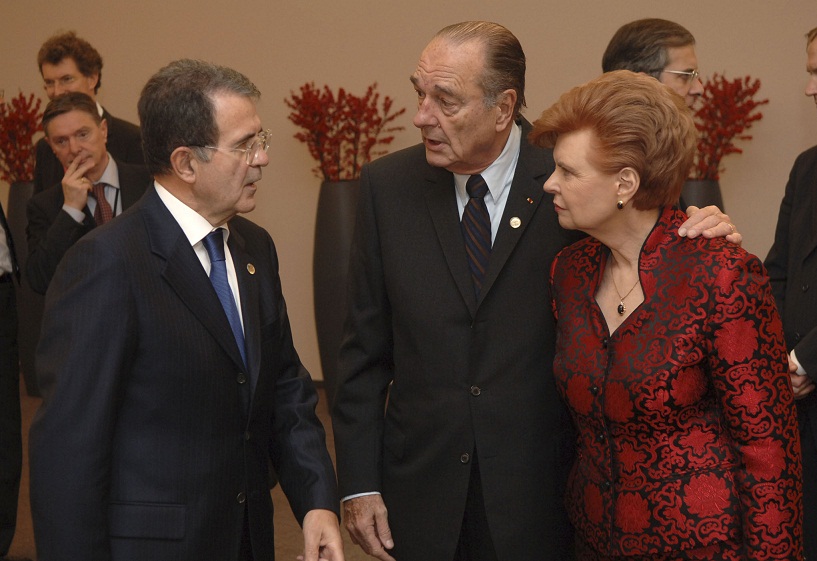<Back to Index>
- Chemist Martin Heinrich Klaproth, 1743
- Sculptor Étienne Maurice Falconet, 1716
- 6th President of Latvia Vaira Vīķe-Freiberga, 1937
PAGE SPONSOR

Vaira Vīķe-Freiberga, born on 1 December 1937, was the sixth President of Latvia and first female President of Latvia and of eastern Europe. She was elected President of Latvia in 1999 and re-elected in 2003.
Dr.
Vaira Vīķe-Freiberga is a professor and interdisciplinary scholar
having published eleven books and numerous articles, essays and book
chapters in addition to her extensive speaking engagements. As
President of the Republic of Latvia 1999 - 2007, she has been
instrumental in achieving membership in the European Union and NATO for
her country. She is active in international politics, was named Special
Envoy to the Secretary General on United Nations reform and was
official candidate for UN Secretary General in 2006. She remains active
in the international arena and continues to speak up in defense of
liberty, equality and social justice, and for the need of Europe to
acknowledge the whole of its history. In December 2007 she was named
vice-chair of the Reflection group on the long term future of the
European Union. She is also known for her work in psycholinguistics,
semiotics and analysis of the oral literature of her native country. Vaira Vīķe was born in Riga, Latvia. At the end of 1944, as the second Soviet occupation of Latvia begun, her parents escaped to Germany. There she received her first education in Latvian primary school at a refugee camp in Lübeck, Germany. Then her family moved to French Morocco in 1949. In Morocco she attended French primary school at Daourat hydroelectric dam village where she learned the French language. Vaira then went on to attend Collège de jeunes filles de Mers-Sultan in Casablanca. In 1954 her family moved to Toronto, Canada, where she completed high school. Vaira Vīķe attended Victoria College of the University of Toronto, graduating with a bachelor of arts in 1958 and a master of arts in 1960, in psychology. She worked at the Canadian Imperial Bank of Commerce as a teller and part time as a supervisor in Branksome Hall Boarding
School for Girls. In 1958, being fluent in English, French, Latvian,
Spanish and German, she worked as a translator and the next year went
on to work as a Spanish teacher for grades 12 and 13 at Ontario Ladies' College. Upon graduation, Vīķe became a clinical psychologist at the Toronto Psychiatric Hospital in late 1960. She left in 1961 to resume her education at the McGill University in Montreal while also lecturing part-time at Concordia University. She earned her PhD in experimental psychology, graduating from the university in 1965. From 1965 to 1998 Vaira Vike-Freiberga pursued a professorial career at the Department of Psychology of the French speaking University of Montreal, where she taught psychopharmacology, psycholinguistics, scientific theories, experimental methods, language and cognitive processes.
Her experimental research focused on memory processes and language, and
the influence of drugs on cognitive processes. At the same time she did
scholarly research on semiotics, poetics and the structural analysis of computer accessible texts from an oral tradition -- the Latvian folksongs.
During this period she authored ten books and about 160 articles,
essays or book chapters and has given over 250 speeches, allocutions
and scientific communications in English, French or Latvian, and gave
numerous radio, TV and press interviews in various languages. During
that period Dr. Vike-Freiberga has held prominent positions in national
and international scientific and scholarly organizations, as well as in
a number of Canadian governmental, institutional, academic and
interdisciplinary committees, where she acquired extensive
administrative experience. She is the recipient of many medals, prizes and honours for distinguished work in the humanities and social sciences. In June 1998 she was elected Professor emerita at the University of
Montreal and returned to her native land, Latvia, where on 19 October
the Prime Minister named her Director of the newly founded Latvian
Institute.
Vaira Vīķe-Freiberga became President of Latvia in 1999. Although not a candidate in the first ballot, she was drafted by the Saeima (Latvian
Parliament) and was elected to the office of President of Latvia on 20
June. She was sworn in on 8 July. Her approval rating has ranged
between 70% and 85%, and in 2003 she was re-elected for a second term
of four years with 88 votes out of 96. She
has actively exercised the powers conferred on the President by the
Constitution of the Republic of Latvia and has played a leading role in
achieving Latvia’s membership in NATO and the European Union. She was an invited speaker at numerous international events (such as the joint session of the United States Congress, in
June 2006), as well as an outspoken pundit on social issues, moral
values, European historical dialogue, and democracy. During her
presidency she regularly visited towns and villages to meet her
constituents in person, and received many thousands of letters yearly
from Latvians. In April 2005, then United Nations Secretary General Kofi Annan named Vīķe-Freiberga as a member of his team of global political leaders helping to promote his comprehensive reform agenda. In September 2006, the three Baltic States officially announced her candidacy for the post of United Nations Secretary General. Since
the end of her presidency in July 2007, Dr. Vike-Freiberga has been
actively participating as an invited speaker at a wide variety of
international events. She is a founding member of the Club of Madrid, a
member of the European Council on Foreign Relations, and honorary
patron of several Foundations. She was a member of the Support
Committee of the 2007 European Book Prize and an honorary patron of the
Paris Colloquium on the Teaching of European literatures. On 14
December 2007 she was appointed Vice-president of the Reflection Group
on the long term future of the European Union. In 2008 she became Member of the European Council on Tolerance and Reconciliation.
During the Spring semester 2008 she was an invited Senior Fellow at the
Institute of Politics, John F. Kennedy School of Government, Harvard
University. She was chair of the European Research Area Board Identification Committee (2008), chair of the Review panel of the
European Research Council (2009), and since December 2007, vice-chair
of the Reflection group on the long term future of the European Union.
Vaira Vīķe-Freiberga has also been appointed on the Advisory Board of European Association of History Educators EUROCLIO. She was the only female candidate for the first President of the European Council. Herman van Rompuy was eventually chosen for that position. Vike-Freiberga has said that under the Lisbon Treaty and beyond, a federal Europe is desirable. Vike-Freiberga
has received many medals and awards, including the 2005 Hannah Arendt
Prize for political thought, the 2007 Emperor Otto Prize for
contributions in defining European identity and future, and the 2009
Hayek Medal for promotion of freedom and free trade. She has been
awarded 37 Orders of Merit and 16 Honorary Doctorates. She is a member
of the Latvian Academy of Sciences, a fellow of the Royal Society of
Canada and an associate member of the Académie Royale de
Belgique. Four
biographies about President Vaira Vike-Freiberga have been published
(in Latvian, English, French, Finnish, Italian, Russian and Spanish),
and a full length documentary film “The Threefold Sun” in 2008.
Vaira Vīķe-Freiberga is married to Imants Freibergs, formerly a professor of computer sciences at Université du Québec à Montréal. He was the President of the Latvian Information and Communications Technology Association (LIKTA)
while his wife was President of Latvia. The couple met at the Latvian
Students Club in Toronto. They have two children, Kārlis and Indra. Dr.
Vike-Freiberga and Dr. I. Freibergs have founded a company “VVF
Consulting” that offers consulting services to public and private
organizations.


